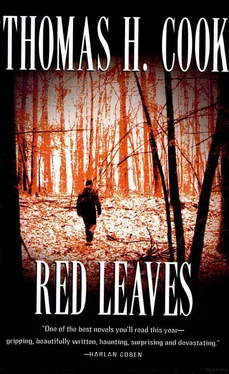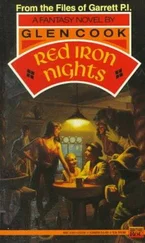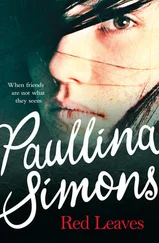By the fall of 1974, he had nothing left but the family house, itself mortgaged to the gills, literally sinking in a slough of debt. I was twelve years old that autumn, now attending the expensive private school my father had denied Warren, a little boy dressed in his school uniform, complete with navy blue blazer with brass buttons, the crest of Saint Regis embroidered on the breast pocket.
Each night, I returned to a house that was disappearing, though I didn't know that at the time. Warren stayed in his room most of the time, and Jenny had begun complaining of terrible headaches. My mother made increasingly modest meals, which she served at a table my father hardly frequented anymore. "He's in New York," my mother would explain, "on business."
The disastrous nature of that business was apparent in the papers I rifled through that night, applications for loans and their subsequent denials, threatening letters from lawyers and creditors and even local tradesmen, all of them demanding payment ... or else.
Under such a barrage, men have been driven to suicide or simply run away, in either case leaving their families to fend for themselves. But on rare occasions some men take a third, far more drastic, option. They kill their families.
Until that night, it had never occurred to me that at some desperate moment, with the fifth scotch of the evening trembling in his hand, my father might actually have considered this final course.
Then, suddenly, it was there, the terrifying suggestion that he had.
A suggestion, not evidence, and yet it stopped me cold, so that for a long time, I simply stared at what I'd stumbled upon, the real estate section of the Los Angeles Times , dated April 27, 1975, and wondered how this particular section of a paper from a city several thousand miles away had come into my father's hands, and why, halfway down column three, he had drawn a red circle around a particular advertisement, one offering a "neat, clean, studio ... suitable for bachelor."
Suitable for bachelor.
In what way, I wondered, had my father planned to be a bachelor again?
Was it only that he'd considered option one, abandonment?
Or had he considered option three as well, a final, irrevocable break that would truly leave him free?
I didn't know, couldn't know, and yet, in my current state of mind, one the shadowy basement perfectly mirrored, I found that I could neither dismiss the possibility that my father had truly contemplated our murders nor suppress my need to discover if he actually had.
And so I continued through his papers, watching with an ever-deepening sense of desperation as his circumstances grew more dire. As the weeks of that last disastrous year passed, the dunning letters became more threatening and my father's responses increasingly laced with fabrications. He began to invent correspondence with "anonymous backers," to claim sources of revenue he did not have, and to pepper his letters with the names of important people—mostly politicians—who were, he said, "getting in on the ground floor" of whatever wholly fanciful enterprise he was at that moment proposing. The line between delusion and reality appeared to fade, and because of that, I could no longer tell if he was outright lying or if he had begun to believe his own fantasies.
Then, in yet another stack of business correspondence, this one interspersed with yellowing family photographs, I found a letter from my father's sister, Emma. It was dated February 3, 1975, a short two and a half months before my mother's death. One line in particular caught my attention: " As you say, Edward, these current straits are due entirely to Margaret's outrageous spending. "
My mother's outrageous spending? On what had my mother spent outrageously? I knew the answer all too well. She had spent "outrageously" on used clothes at the Catholic thrift shop, on bruised vegetables at the market. She'd spent on bent cans and day-old bread. Despite our dwindling resources, she had tried with all her might to keep her children decently clothed and fed. During the year of Jenny's death, she had bought absolutely nothing for herself. Not so much as a hat or an earring.
That my father could blame my mother for his own financial mismanagement was deplorable enough. But the line he'd scrawled in the margin beside my aunt's comment was worse: " Now let her get me out of it. "
Me.
Not us.
So what exactly were we—his wife and three children—to my father, I wondered. The answer was implicit in his use of "me." We were nothing.
We were nothing, and so he could go to New York, pick up a copy of the Los Angeles Times, pull out the real estate section, peruse it casually on the train back to Wesley, circle an ad for a neat clean studio, "suitable for bachelor."
And how might he regain his bachelorhood?
The darkest possible scenario immediately unspooled in my mind: my father waiting until deep in the night, then moving silently downstairs to his office, opening the rolltop desk, unlocking a small wooden cubicle, and drawing out the pistol he had always kept there. The very pistol which, as if in some miraculous vision, glimmered darkly before me, still in the cubicle where he'd left it. Had he reached for it, as I now did, then taken it up the stairs to where his family slept, as my family also did, he would have been but three quick shots from freedom.
But if that had ever been his plan, why had he not done it? Others had. Men like my father, ruined in business, in dread of humiliation, men who'd lost everything, and so, on a cool evening had decided to start over in the most profound and devastating way a man can seek deliverance. They had methodically murdered their families. Why had my father refused to take that road? Why had he not even decided on the less awesome route of simply climbing on a plane or train or bus and vanishing into the night?
I knew that his remaining with us had nothing to do with love. My mother's power over him had faded with her beauty. He felt nothing but contempt for Warren. And Jenny, for whom he'd seemed to have a true affection, had only just died. That left me, and so, briefly, I entertained the notion that his hopes for me had provided the one force that held us together. He had, after all, sent me to the best school, and when he talked about my future, it was always in the brightest terms. I would go to an Ivy League college, become a powerhouse in some business or law firm. I would be the son he'd dreamed of, proof of his worth, as much an ornament as my mothers beauty had once been.
But by April 1975, even that dream was surely dying. There would be no money for an Ivy League education, as my father must have known, and without it how could I fulfill his vision of a rich, successful son?
For a moment, I considered my fathers predicament. He was bankrupt, saddled with a family he cared little for, his daughter already dead.
Why then had he stayed with us?
The answer occurred to me instantly. He'd stayed because somewhere in the dark tangle of his business and family relations, he had found a way out.
The single line he'd written in the margin of his sister's letter now returned to me in a sinister whisper. Now let her get me out of it.
In a vision, I put myself in my brother Warren's place on that long ago summer afternoon. I am sitting on the grand staircase, reading a book. The doorbell rings. I answer it. A tall lean man in a dark suit draws a gray hat from his head and stares at me with small, quiet, sparklingly inquisitive eyes. His voice is calm, soothing, like Peak's: No reason to be alarmed. He is from the insurance company, he says, investigating something, that much is clear, though he doesn't tell me what he's looking into. And so I let him in, as Warren did, then go back to the stairs, my book. He leaves after a few minutes. He does not tell me what he was looking for, and the years go by and I marry and have a son and never ask him what he sought that day.
Читать дальше












